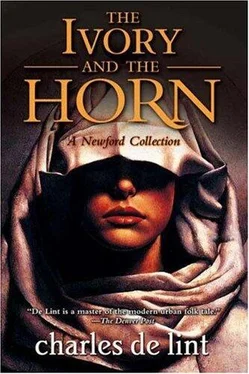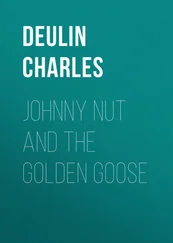Got no time?
Maybe the measurement's different from me to you to that girl who gives you your ticket at the bus depot, but the one thing we've all got is time. You can use it or lose it, your choice. That's how come we've got that old saying about how it's not having a thing that's important, but how we went about getting it. Our time's the most precious thing we've got to offer folks, and the worst thing a body can do is to take it away from us.
So don't you go wasting it.
But I was talking about possibilities and little stories, things, that maybe don't even make it into the paper. Like what happened to Saxophone Joe.
I guess everybody knows how a cat's got nine lives, and I'm thinking a few more of you know how those lives are divided up: three to play, three to stray, and the last three to stay. Maybe that's a likeness for our own lives, a what-do-you-call-it, metaphor. I don't know.
But grannies used to tell their children's children how if a cat came to live with you of its own accord during one of its straying lives, why you couldn't ask for better luck in that household. And that cat'd stay, too, unless you called it by name. Not the name you gave it, or maybe the one it gave you— it comes wandering in off the fire escape with its little white paws, so you call it Boots, or maybe it's that deep orange like you'd spread on your toast, so you call it Marmalade.
I'm talking about its secret name, the one only it knows.
Anyway, Joe's playing six nights a week with a combo in the Rhatigan, a little jazz club over on Palm Street; him on sax, Tommy Morrison on skins, Rex Small bellied up to that big double bass, and Johnny Fingers tickling the ivories. The Rhatigan doesn't look like much, but it's the kind of place you never know who's going to be sitting in with the band, playing that long cool music.
Used to be people said jazz was the soul of the city, the rhythm that made it tick. A music made up of slick streets and neon lights, smoky clubs and lips that taste like whiskey. Now we've got hip hop and rap and thrash, and I hear people saying it's not music at all, but they're plain wrong. All these sounds are still true to the soul of the city; it's just changed to suit the times is all.
One night Joe's up there on the Rhatigan's stage, half-sitting on his stool, one long leg bent up, foot supported on a rung, the other, pointing straight out across the stage to where Johnny's hunched over his piano, fingers dancing on the keyboard as they trade off riffs. There's something in the air that night, and they're seriously connected to it.
Joe takes a breath, head cocked as he listens to what Johnny's playing. Then, just as he tightens his lips around the reeds, he sees the woman sitting there off in a dark corner, alone at her table, black hair, black dress, skin the same midnight tone as Joe's own so hat she's almost invisible, except for the whites of her eyes and her teeth, because she's looking right at him and she's smiling.
Dark eye, she's got, like there's no pupils, watching him and not blinking, and Joe watches her back. He's got one eye that's blue and one eye that's brown; and the gaze of the two of them just about swallows her whole.
But Joe doesn't lose the music, doesn't hesitate a moment; his sax wails, coming in right when it should, only he's watching the woman now, Johnny's forgotten, and the music changes, turns slinky, like an old tomcat on the prowl. The woman smiles and lifts her glass to him.
She comes home with him that night, just moves in like she's always been there. She doesn't talk, she doesn't ever say a word, but things must be working out between them because she's there, isn't she, sharing that troy room Joe's had in the Walker Hotel for sixteen years. Live together in a small space like that, and you soon find out if you can get along or not.
After a while, Joe starts calling her Mona because that's the name of the tune they were playing when he first saw her in the Rhatigan and, musicians being the way they are, nobody thinks it strange that she doesn't talk, that she's got no ID, that she answers to that name. It's like she's always been there, always been called Mona, always lived with Saxophone Joe and been his woman.
But if he doesn't talk to anyone else about it, Joe's still thinking about her, always thinking about her, if he's on stage or walking down a street or back in their room, who she is and where she came from, and he finds himself trying out names on her, to see which one she might've worn before he called her Mona, which one her momma and poppa called her by when she was just a little girl.
Then one day he gets it right, and the next morning she's gone, walked out of his life like the straying cat in the story the grannies tell, once someone's called her by her true, secret name. What was her name, this woman Joe started out calling Mona? I never learned. But Joe knows the story, too, cats and names, and he gets to thinking some more, he can't stop thinking about Mona and cats, and then he gets this crazy idea that maybe she really was a cat, that she could change, cat to woman, woman to cat, slipped into his life during her straying years, and now she's gone.
And then he gets an even crazier idea: The only way to get her back is if he gets himself his own cat skin.
So he goes to see the priest— not the man with the white collar, but the hoodoo man— except Papa Jo-el's dead, got himself mixed up with some kind of juju that even he couldn't handle, so when Joe goes knocking soft on Papa Jo-el's door, it's the gris-gris woman Ti Beau that answers and lets him in.
Friday night Joe's back in the club, and he's playing a dark music now, the tone of his sax's got an undercurrent in it, like skinheaded drums played with the palm of your hand and a tap-tap of a drumstick on a bar of iron, like midnight at a crossroads and the mist's coming in from the swamp, like seven-day candles burning the wind, but those candies don't flicker because the gateways are open and les invisibles are there, holding the flames still.
Saturday night, he's back again, and he's still playing music like no one's heard before— not displeasing, just unfamiliar. Tommy and Rex, they're having trouble keeping the rhythm, but Johnny's following, note for note. After the last set that Saturday night, he walks up to where Joe's putting his sax away in its case.
"You been to see the mambo?" Johnny asks, "playing music like that?"
Joe doesn't answer except to put his sax case in Johnny's hands.
"Hold on to this for me, would you?" he asks.
When he leaves the club that night, it's the last time anybody sees him. Sees the man. But Heber Brown, he's been working at the Walker Hotel for thirty years. When he's cleaning out Joe's room because the rent's two months due and nobody's seen him for most of that time, Heber sees an old tomcat on the fire escape, scratching at the window, trying to get in. Heber says this cat's so dark a brown it's almost black, like midnight settled in the corner of an alleyway, and it's got one blue eye, so you tell me.
You think Ti Beau's got the kind of gris-gris potion to turn a man into a cat, or maybe just an old cat skin lying about that'll work the same magic, someone says the right words over it? Or was it maybe that Joe just up and left town, nursing a broken heart?
Somebody taped that last set Joe played at the Rhatigan, and I'll tell you, when Johnny plays it for me, I hear hurting in it, but I hear something else, too, something that doesn't quite belong to this world, or maybe belonged here first but we kind of eased it out of the way once we got ourselves civilized enough. It's like one of the loa stepped into Joe that night, maybe freed him up, loosened his skin enough so that he could make the change, but first that spirit talked to us through Joe's sax, reminding us that we weren't here first, and maybe we won't be here the last either.
Читать дальше












